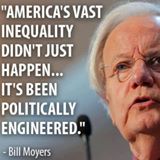March 2013 was a pivotal month for the debate over Crony Capitalism in America. On March 13, 2013, Argentina's Jorge Mario Bergoglio of Argentina was elected Pope Francis and on March 27th David Stockman, launched his book tour for his New York Times bestseller The Great Deformation: The Corruption of Capitalism in America.
David Stockman writes in his introduction to The Great Deformation: "Fiscal cliffs as far as the eye can see are the deeply troubling outcome of the Great Deformation. They are the result of capture of the state, especially the central bank, the Federal Reserve, by crony capitalist forces deeply inimical to free markets and democracy. Why we are mired in this virtually unsolvable problem is the reason I wrote this book. " In the book Stockman makes the case that these deeply troubling outcomes didn't occur overnight, but were eight decades in making by the crony capitalist forces.
Pope Francis' outspokenness regarding Capitalism was met with the following response, from Rep. Paul Ryan:
Late last year, Ryan, who is Catholic, was asked how the pope's criticism of capitalism squared with the Republican Party's message. Paul had argued that the pope didn't really understand the U.S. economy because the "guy is from Argentina; they haven't had real capitalism in Argentina."
During a Sunday interview a few weeks ago, ABC host George Stephanopoulos asked the Wisconsin Republican if he had been "a little too flip" in criticizing the pope.
"No, not at all," Ryan insisted. "They have crony capitalism in Argentina, where you have exploitation. That is not the free market, that's crony capitalism. We're starting to see some crony capitalism here in America."
We see a stark contrast regarding crony capitalism in America, with David Stockman's eight decades in making position and Rep. Paul Ryan's " We're starting to see some crony capitalism here in America" contention. Like most controversies the truth, in all likelihood, can be found somewhere between these extremes.
According to Wikipedia:
" The fast track negotiating authority (also called trade promotion authority or TPA, since 2002) for trade agreements is the authority of the President of the United States to negotiate international agreements that the Congress can approve or disapprove but cannot amend or filibuster. Fast-track negotiating authority is granted to the President by Congress."
"Presidential candidate George W. Bush made fast track part of his campaign platform in 2000. In May 2001, as president he made a speech about the importance of free trade at the annual Council of the Americas in New York, founded by David Rockefeller and other senior U.S. businessmen in 1965. Subsequently, the Council played a role in the implementation and securing of TPA through Congress."
"At 3:30 a.m. on July 27, 2002, the House passed the Trade Act of 2002 narrowly by a 215 to 212 vote with 190 Republicans and 27 Democrats making up the majority. The bill passed the Senate by a vote of 64 to 34 on August 1, 2002. The Trade Act of 2002, 2103-2105 (19 U.S.C. 3803-3805), extended and conditioned the application of the original procedures."
"The authority expired on July 1, 2007, without being renewed by Congress."
"In October 2011, Congress and the President Obama enacted into law the Colombia Trade Promotion Agreement, the South Korea -- United States Free Trade Agreement, and the Panama -- United States Trade Promotion Agreement using fast track rules, all of which the George W. Bush administration signed before the deadline."
"In early 2012, the Obama administration indicated that renewal of the authority is a requirement for the conclusion of Trans-Pacific Strategic Economic Partnership (TPP) negotiations, which have been undertaken as if the authority were still in effect. In July 2013, Michael Froman, the newly confirmed U.S. Trade Representative, renewed efforts to obtain Congressional reinstatement of "fast track" authority. At nearly the same time, Senator Elizabeth Warren questioned Froman about the prospect of a secretly-negotiated, binding international agreement such as TPP that might turn out to supersede U.S. wage, safety, and environmental laws. Other legislators expressed concerns about foreign currency manipulation, food safety laws, state-owned businesses, market access for small businesses, access to pharmaceutical products, and online commerce."
Sponsors of the Bipartisan Congressional Trade Priorities Act of 2014, introduced early 2014 by Senator Max Baucus and Congressman Dave Camp, called it a "vital tool" in connection with negotiations on the Trans-Pacific Partnership (TPP) and the Transatlantic Free Trade Area (TAFTA). Critics said the bill could detract from "transparency and accountability".
(Note: You can view every article as one long page if you sign up as an Advocate Member, or higher).






